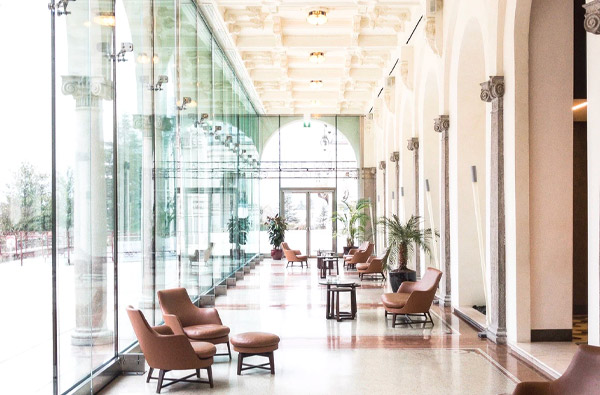Table of contents
Let’s allow ourselves to look beyond the near-future, beyond COVID-19, to where our industry should be aiming. So what will the next generation of hospitality look like? Creativity and experience will be at its core.
The hotel of the future will be more like the hotel of the past. With so many properties stuck in a model of heads-in-beds and wall-to-wall beige, a return to the original values of hospitality will help hoteliers adapt to an ever more disruptive world. Those values? A deep respect for the traveler arriving cold and hungry from a long journey, whose individual wants and needs are meticulously attended to. Unlike in the past, however, technology will play an increasingly important role.
What trends can we expect for the hotel of the future?
Our industry is changing fast as consumer tastes evolve, particularly as new trends in hospitality unfold in the wake of Covid-19. In terms of the bigger picture, the way Mews thinks about this was echoed in a recent Deloitte report. It made the point that brand and the promise of consistency has been the key market driver for some time. But the future is more exciting: we’ll go beyond hotel-as-brand—purveyors of a (usually rather dull) global standard—and hotels will transform into a place where experiences are built, ones which need to be highly responsive to customer desires.
Automation enables human experiences
We see the hotelier's role as helping to build a trip in its totality, and experience curation will be the decisive factor in the future success or failure of hotels. As technology automates more and more backstage functions, it frees up hotel staff to do what humans are best at: being creative and thoughtful. Winners in the new tech age will be brands who are able to go beyond a guest’s basic expectations and leave an indelible mark on their memory. After all, travelers give the hotelier something very special: the gift of their desire for an unforgettable experience. They come to hotels looking to be taken care of, and we should look to create a lifelong feeling—this begins with knowing what delights them.
A focus on hotel sustainability
In some ways this is a question of ambition, reimagining hospitality from the ground up. This unprecedented pandemic may end up accelerating the reimagining, but whenever travel returns to some sort of new normality, our core desire for experience will win out. As an everyday example, sustainability remains at the forefront of consumers' minds. Clearing out that staple of big-brand hospitality—small plastic bottles of shower gel—answers the need to reduce plastics. But why not go further? Switch from pre-prepared meals, and instead buy produce from local suppliers, using them to create a fully responsive menu.
Creating unique experiences
There's also a lesson in the tragicomic story of the Fyre Festival. For all its faults, this spectacular non-event illustrated a broad appetite for a new kind of hospitality: the package tour of today that combines exotic location, music, luxury and more, an all-consuming experience of the kind done so well in places such as Ibiza and events like Coachella. Nor is the new experiential travel limited to hedonism: travelers are also looking for time away to learn a new skill or a language.
As cities such as Amsterdam, Barcelona and Prague begin to protect themselves with stricter regulations, travelers will begin to look further afield. A short weekend trip may soon look less enticing or unique than an exploration of Bhutan or Namibia, reliving the Grand Tour or working whilst learning to surf at a retreat in Portugal. In all cases, the same new paradigm applies: people are looking for unique experiences that provide lifelong memories.
Embracing creativity
It's also worth looking beyond hospitality for inspiration. Secret Cinema, where viewers become participants in a live, in-situ screening of a film, has been a huge success, and the global popularity of Pokémon Go showed how gaming can transcend the sofa – some may remember how many would flock to certain parks in the city once it was discovered that certain rare Pokémon were spawning there. It pays to think big, wide and perhaps even weird.
Experience is paramount for travelers today, and will continue to be the number one reason for booking. This also means a welcome new role for hoteliers that frees them up to do what they’re best at—applying creativity—while liberating them from drudgery. Hoteliers in the future will write scripts instead of SOPs, and function more like playwrights or product managers, designing experiences to delight.
Hotels have tried to be all things to all people for too long: it's time for them to start writing some new stories. There’s no reason why the hotel of the future can’t begin today.

2026 Hospitality Industry Outlook
Download now
Table of contents
Hospitality hot takes straight to your inbox



.webp)
